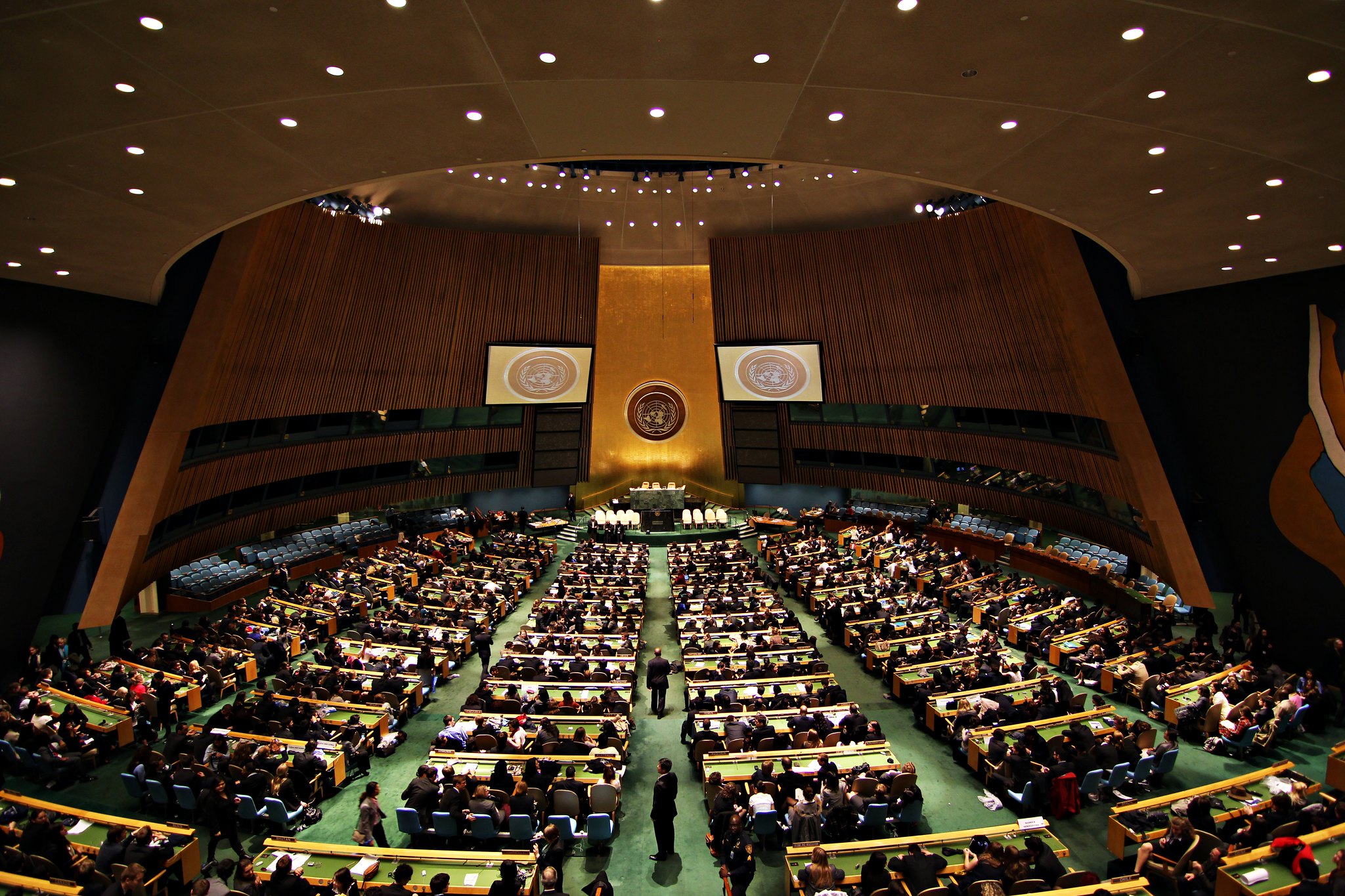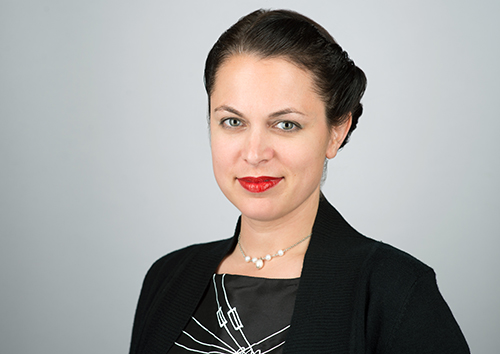Why Are Authoritarians Framing International Approaches to Disinformation?
Time is growing short to craft a vision for safeguarding the information environment that enables democracy and to prepare concrete proposals that will counter the authoritarian vision of central control.

On Nov. 15, the U.N. General Assembly Third Committee approved by consensus a new resolution on disinformation. The draft resolution urges social media companies “to review their business models and ensure that their business operations, data collection and data processing practices are compliant with international human rights standards.” The document speaks of “the right to freedom of expression,” the “importance of free, independent, plural and diverse media,” and the role “information plays in strengthening democracy, promoting pluralism and multiculturalism, enhancing transparency and press freedom, and countering disinformation.” While a quick glance would suggest this is a welcomed step forward, the countries backing the resolution raise interesting questions about their intentions and motives.
Pakistan introduced the resolution entitled “Countering disinformation for the promotion and protection of human rights and fundamental freedoms,” and it was co-sponsored by the Central African Republic (CAR), Côte d’Ivoire, Eritrea and the Russian Federation. These countries are not defenders of democracy and human rights at home.
Each year, the Economist Intelligence Unit ranks 165 states and two territories along five categories: electoral process and pluralism, the functioning of government, political participation, political culture, and civil liberties. In its Democracy Index 2020, the unit ranked three of these countries as authoritarian, and two (Côte d’Ivoire and Pakistan) as hybrid regimes in which election irregularities are common, ruling parties pressure journalists, corruption is rife and the rule of law weak. Freedom International’s Freedom in the World report graded Côte d’Ivoire and Eritrea as “not free,” while the other three were “partly free.” Eritrea ranked dead last at 180 in Reporters Without Borders’s 2021 World Press Freedom Index, with Russia following at 150, Pakistan at 145, CAR at 126 and Côte d’Ivoire at 66. In Transparency International’s Corruption Perceptions 2020 Index, none of the signatories cracked the top 100 in the “least public sector corruption” category. In fact, Côte d’Ivoire ranked 160 out of 179.
Compare these rankings to the original Group of 7 (G-7) countries (Figure 1), which mostly rank in the top 50 on every measure (although Japan appears to have some work to do on media freedoms and Italy on corruption). All the G-7 countries are ranked “free,” and most are “full” democracies (France, Italy and the U.S. are rated as “flawed”).
Figure 1. A depiction of various countries’ rankings in terms of corruption perceptions, freedom of media and the Democracy Index.
So why did a group of autocracies sponsor a resolution claiming to advance universalist, democratic principles? One reason could be that they could benefit from norms that give states control of the information environment within their physical borders. The document focuses on state responsibility to counter disinformation while making perfunctory allowances to “the role played by all stakeholders,” without ever really mentioning who those might be beyond “international organizations, States, [and] business enterprises.” When considered in the context of the sponsors’ systematic efforts to limit public access to information and erode independent media, this resolution is alarming. The committee’s press release gives up the game, noting that “the representative of the Russian Federation drew attention to the slow pace of reining in global information technology companies so that they comply with their obligations to States and society.” Despite all the democratic packaging, this resolution is more about setting the stage to control the information environment than it is about protecting democracy.
Such long-range strategizing is consistent with Russian policymakers’ holistic framing of the information environment, which includes both information warfare between states and the subtler concept of information struggle—whereby media are used to influence knowledge, moral values and public consciousness. While Western discussions focus on countering individual threats and specific kinds of disinformation, Russia is leading its allies in framing the global information environment in line with their own vision.
The adoption of this resolution by consensus means that no single democracy or alliance of democratic countries was willing to call for a vote. This suggests that their U.N. delegations either accepted the language or calculated that the result would not be in their favor. Both possibilities emphasize the weakness in Western governments’ approaches to countering disinformation.
Some of that weakness is inescapable. Democratic societies, by their very nature, are built on the principles of plurality of opinions, stakeholder participation and informed debate—meaning the process of developing a common approach takes time. But some of the weakness is a function of poor institutions. There is no clear “center of gravity” on the information environment in the U.S. government. And because democratic countries have not yet built the right kind of research institutions to study it, we know shockingly little about how the information environment works as a system. It is no surprise that the jury is still out on what works to counter influence operations, particularly those conducted over social media.
The fact is, Western countries, with the G-7 at the helm, aren’t just losing ground; they aren’t in the race at all, at least not at the U.N. The Pakistan-led resolution contains an operational paragraph that requests the secretary-general to seek the views from states and other stakeholders, and then submit a report at the 2022 U.N. General Assembly session “based on information and best practices” on countering disinformation. There is little doubt that Russia and its authoritarian allies will be submitting their proposals, which could then become models for how other countries frame their approaches to disinformation. Why else would they have included a call for action in the resolution?
This means the time is growing short to craft a vision of an information environment that enables democracy and to prepare proposals that will counter the authoritarian vision of central control. Because in the absence of a functional model from Western countries, pressure will grow to shape the global information space to favor anti-democratic values.
The resolution closes with applause for the secretary-general’s efforts to “promote international cooperation in countering disinformation, and in this regard takes note of his call for a ‘global code of conduct that promotes integrity in public information’.” The question is, with democracies dithering, who will hold the pen on that global code of conduct? If this resolution is any indication, it won’t likely be the “free” countries.
But if they choose to act, democracies should follow a few guiding principles on norms relating to how states engage in the information environment.
First, be active in defining the problem. Since the resolution calls for proposals to be sent to the secretary-general, the G-7 and the European Union should take that opportunity to frame the problem. Right now, the major platforms’ consumer-facing notion of trust and safety is the main lens through which the information environment is viewed. This perspective pushes the focus toward specific threats and their remediation, rather than encouraging a holistic view of how disinformation is impacting societies and what goods the private companies that control the information commons should seek to advance.
Second, reinforce norms of noninterference. More than two dozen states have used state resources to target their domestic populations with disinformation, but few have actively targeted other countries. So far only Russia has used the tool widely, conducting dozens of campaigns since 2012, with a few others such as Iran and China using this approach against a much smaller number of targets. But the potential for rapid proliferation of cross-border disinformation campaigns is significant, which would pollute democratic spaces around the world.
Third, leverage principles from other areas of human activity. Most of the world has converged in the environmental sphere on the principle that people have the right to clean air and water, meaning companies must pay to remediate the externalities of their production. Energy producers face emissions restrictions, chemical companies must dispose of waste safely, and pharmaceutical companies must run a years-long gauntlet of testing before they can bring proposed drugs to market.
Social media create externalities too, and they are here to stay. The world’s leading democracies should be treating them as such and take the lead in developing international principles for their governance.





.jpg?sfvrsn=3792d97a_5)
